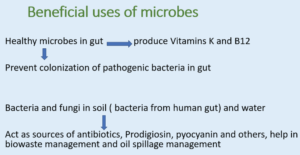Leveraging Microbes for Human Benefit
Introduction
Microorganisms, commonly known as microbes, are ubiquitous in our environment and have been integral to human health and survival for centuries. While many microbes are often associated with disease and infection, a significant majority of them play crucial roles in promoting public health. In fact, microbes have become indispensable allies in improving human health and well-being, making their proper understanding and application essential in the field of public health.
This blog post delves into the wide-ranging benefits of microbes for human health, including their role in probiotics, antibiotic production, and waste biodegradation. The utilization of microbial properties has led to numerous advancements in public health, contributing to the management of diseases, enhancing immunity, and improving overall health outcomes. The continued research and application of beneficial microbes are fundamental to developing new therapeutic strategies that benefit public health globally.

Figure 1: Yogurt (curd) as a probiotic food. Source of image: Author.
The Role of Microbes in Public Health
Microbes, both beneficial and harmful, are present in our bodies and environment. While pathogenic microbes are responsible for many infectious diseases, the beneficial microbes contribute to essential processes such as digestion, immune system function, and protection against harmful pathogens. The relationship between humans and microbes is complex and often symbiotic, where microbes perform functions that are beneficial to human health, and in return, humans provide an environment conducive to microbial growth.
The beneficial aspects of microbes are vast and diverse, and they play an essential role in maintaining the balance of public health. In this section, we will explore the various ways in which microbes contribute to human health, particularly in the context of probiotics, therapeutic enzymes, and antibiotic production.
Probiotics and Gut Health
One of the most well-known applications of microbes is in the use of probiotics. Probiotics are live microorganisms that, when consumed in adequate amounts, provide health benefits to the host. The most common examples of probiotic microbes include species like Lactobacillus, Bifidobacterium, and Saccharomyces cerevisiae var. boulardii. These probiotics help maintain a healthy balance of gut microbiota, outcompeting harmful pathogens and enhancing digestive health.
In the context of public health, probiotics play a significant role in the prevention and management of gastrointestinal disorders, such as Irritable Bowel Syndrome (IBS), Inflammatory Bowel Disease (IBD), and diarrhea caused by infections. The short-chain fatty acids (SCFAs) produced by probiotics, such as butyric acid, also help nourish the cells of the gut lining, enhancing gut integrity and function. Moreover, probiotic bacteria play a vital role in boosting immunity, as they stimulate the production of IgA (Immunoglobulin A), which helps protect the gut from infections.
In public health, the promotion of probiotics as part of a balanced diet can help reduce the burden of gastrointestinal diseases and improve overall health outcomes. This makes probiotics an essential tool in preventive healthcare, particularly in regions where gastrointestinal infections are prevalent.

Figure 2: Various applications in harnessing microbes for the benefit of mankind (Image source: Author).
Microbes in Antibiotic Production: A Public Health Milestone
The discovery of antibiotics revolutionized medicine and dramatically changed the landscape of public health. Many of the antibiotics we use today are derived from microorganisms, and their discovery has saved millions of lives. Penicillin, the first widely used antibiotic, was discovered from the mold Penicillium notatum by Alexander Fleming in 1928. This breakthrough paved the way for the discovery of other antibiotics such as gentamicin, tetracycline, and cephalosporins, all of which are produced by microbes.
The use of antibiotics has greatly improved public health by treating bacterial infections and reducing mortality rates from diseases that were once fatal. Antibiotic production, which was once limited to a few compounds, has expanded due to the ongoing discovery of new microbial strains and their metabolites. Today, microbial biotechnology plays a crucial role in discovering novel antibiotics to combat the rising threat of antibiotic resistance, which poses a major challenge to global public health.
Moreover, antibiotics are not only important for treating infections but also play a role in enhancing the safety of public health interventions such as surgery, where infection prevention is critical. The continuous exploration of microbes for new antibiotic compounds is essential for maintaining the effectiveness of these drugs and safeguarding the public health systems worldwide.
Microbes in Waste Biodegradation and Environmental Health
In addition to their role in human health, microbes are also integral to environmental health. One of the most significant applications of microbes is in the biodegradation of waste. Microorganisms like Pseudomonas putida and various species of Bacillus are capable of breaking down organic waste, including biomedical waste, hydrocarbons, and other pollutants, into harmless byproducts.
The biodegradation of waste by microbes is a key factor in maintaining a healthy environment, as it helps reduce the accumulation of harmful substances in soil, water, and air. The use of microbes in waste management contributes to environmental health, which is directly linked to public health. Clean environments are essential for reducing the spread of infectious diseases, promoting overall health, and maintaining the well-being of communities.
Public health initiatives often focus on the use of microbial waste management technologies to clean polluted areas and promote sustainable practices. This is particularly important in regions where industrial pollution and improper waste disposal threaten public health. Microbes provide a natural, efficient, and environmentally friendly solution to these challenges, reinforcing their importance in global public health.
Microbes in the Production of Vaccines
Vaccines are one of the most effective tools in public health for preventing infectious diseases. Many vaccines are derived from microbes, whether they are live attenuated, inactivated, or subunit vaccines. Microbes used in vaccine production include bacteria like Salmonella spp. and Escherichia coli and viruses like the inactivated polio virus.
The role of microbes in vaccine production cannot be overstated. The hepatitis B vaccine, for example, is produced using a recombinant form of the hepatitis B virus produced in Saccharomyces cerevisiae (baker’s yeast). This approach has been instrumental in eliminating hepatitis B transmission in many parts of the world.
In public health, vaccines play a crucial role in reducing the incidence of preventable diseases. The development and distribution of vaccines have helped eradicate diseases like smallpox and significantly reduced the incidence of diseases like measles, polio, and tuberculosis. The continued use of microbes for vaccine development is a cornerstone of global public health efforts to control infectious diseases.
Microbes and the Future of Public Health
As we look to the future of public health, the continued exploration of microbes and their applications will be essential in addressing emerging health challenges. Microbes hold immense potential in areas such as cancer treatment, mental health, and vaccine development. For example, recent studies have shown that certain microbes can produce compounds with anticancer properties, while others may play a role in regulating the gut-brain axis, influencing mental health.
The future of public health will undoubtedly rely on innovative microbial therapies that harness the natural properties of microorganisms to promote health and well-being. By advancing our understanding of the beneficial roles microbes play, we can develop new treatments, improve health outcomes, and ensure better public health for all.
Conclusion
Microbes are an integral part of human life, with both beneficial and harmful roles in our health. The continued harnessing of microbes for their medicinal, environmental, and industrial applications offers tremendous benefits to public health. From probiotics that enhance gut health to the development of new antibiotics and vaccines, microbes have proven themselves to be indispensable allies in improving public health worldwide.
As research into the uses of microbes continues, we can expect even more groundbreaking discoveries that will help to manage and prevent diseases, enhance healthcare systems, and improve the overall quality of life for individuals across the globe. The future of public health is closely intertwined with the continued exploration of the potential of microbial applications.
